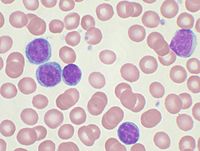
Photo from wikipedia
Ibrutinib, a first‐generation Bruton's tyrosine kinase (BTK) inhibitor, could improve immunity of relapsed or refractory (R/R) chronic lymphocytic leukemia/small lymphocytic lymphoma (CLL/SLL) patients. Whether zanubrutinib, a second‐generation selective BTK inhibitor,… Click to show full abstract
Ibrutinib, a first‐generation Bruton's tyrosine kinase (BTK) inhibitor, could improve immunity of relapsed or refractory (R/R) chronic lymphocytic leukemia/small lymphocytic lymphoma (CLL/SLL) patients. Whether zanubrutinib, a second‐generation selective BTK inhibitor, has similar effects as ibrutinib remains to be determined. Dynamics of number and immunophenotype of immune cells during zanubrutinib treatment in 25 R/R CLL/SLL patients were examined by flow cytometry and blood routine tests. The expression intensity of programmed death‐1 (PD‐1) on total CD4+ (P < .01), total CD8+ (P < .01), and T helper cells (P < .05) and cytotoxic T lymphocyte‐associated antigen‐4 (CTLA‐4) on total CD4+ (P = .010) and regulatory T cells (P < .05) reduced after treatment. There were significant differences in expression intensity of CD19 (P < .01), C‐X‐C chemokine receptor type 5 (CXCR5) (P < .01), and CD49d (P < .05) on B cells before and after treatment. Downregulation of PD‐1 on T cells and CXCR5 and CD19 on B cells were observed in nearly all patients after zanubrutinib treatment. Programmed death‐ligand 1 expression downregulated, especially in the female, CLL, normal spleen, normal β2‐macroglobulin (β2‐MG) and abnormal lactate dehydrogenase (LDH) subgroups, and CTLA‐4 expression on CD4+ T cells tended to decrease in the male, old, CLL, splenomegaly, abnormal β2‐MG, normal LDH, IGHV‐mutated and wild‐type tumor protein 53 subgroups after zanubrutinib treatment. These findings suggest that zanubrutinib can regulate immunity primarily by improving T cell exhaustion, inhibiting suppressor cells and disrupting CLL cells migration through downregulation of adhesion/homing receptors. Furthermore, favorable changes in cell number and immunophenotype were preferably observed in patients without adverse prognostic factors.
Journal Title: Hematological Oncology
Year Published: 2019
Link to full text (if available)
Share on Social Media: Sign Up to like & get
recommendations!